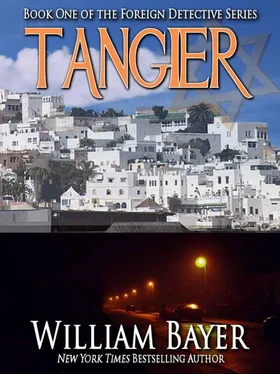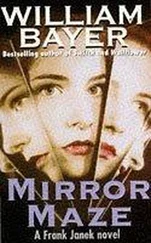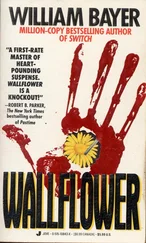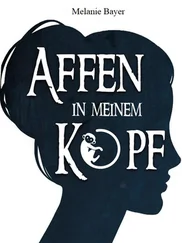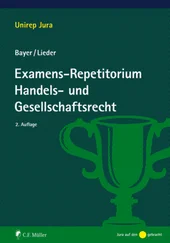William Bayer - Tangier
Здесь есть возможность читать онлайн «William Bayer - Tangier» весь текст электронной книги совершенно бесплатно (целиком полную версию без сокращений). В некоторых случаях можно слушать аудио, скачать через торрент в формате fb2 и присутствует краткое содержание. Жанр: Криминальный детектив, на английском языке. Описание произведения, (предисловие) а так же отзывы посетителей доступны на портале библиотеки ЛибКат.
- Название:Tangier
- Автор:
- Жанр:
- Год:неизвестен
- ISBN:нет данных
- Рейтинг книги:5 / 5. Голосов: 1
-
Избранное:Добавить в избранное
- Отзывы:
-
Ваша оценка:
- 100
- 1
- 2
- 3
- 4
- 5
Tangier: краткое содержание, описание и аннотация
Предлагаем к чтению аннотацию, описание, краткое содержание или предисловие (зависит от того, что написал сам автор книги «Tangier»). Если вы не нашли необходимую информацию о книге — напишите в комментариях, мы постараемся отыскать её.
Tangier — читать онлайн бесплатно полную книгу (весь текст) целиком
Ниже представлен текст книги, разбитый по страницам. Система сохранения места последней прочитанной страницы, позволяет с удобством читать онлайн бесплатно книгу «Tangier», без необходимости каждый раз заново искать на чём Вы остановились. Поставьте закладку, и сможете в любой момент перейти на страницу, на которой закончили чтение.
Интервал:
Закладка:
"I have a new project for a painting," he said. "Six cocks. Just six. The midsections of their owners too, of course-navels, thighs, hairs. The cocks not hard, not erect, just hanging loose. The title: Six Cocks at Midday."
He looked at Jean, and then back to Claude. "With your permission, Madame, I should like to include his in the work."
Jean squirmed with embarrassment, but Claude giggled with glee.
"I'm perfectly serious," said the painter, reaching down and gently taking hold of Jean's organ with his hand. "Good proportions. Good heft. Perhaps I will locate it third from the left, a little closer to the foreground plane, standing out a bit from the other five. You understand the reference, of course: Six Persimmons by the Zen painter Mu Ch'i."
Such erudition! People didn't speak like that in Paris. Jean Tassigny was happy he'd come to live in Tangier. In this white, glittering city one could discover who one was. One could dive through a gleaming surface of idealizations and illusions, and swim about in murky depths.
Now there was danger.
Two days after they read about themselves in Robin's column, Jean and Claude drove out to the airport to meet Monsieur de Hoag. He was flying in from Lisbon on a morning flight. The field was only fifteen minutes from the house, but they left an hour early to drive along the sea.
Claude parked above the "Grottoes of Hercules," caves in the cliffs that marked the entrance to the Straits. They walked down toward the ruin of an ancient Roman sardine factory, eroded by two thousand years of winds and drifting sands. The beach was deserted. They stripped, plunged into the sea, then returned to the sand and made love.
It was a defiant act, well calculated by Claude, for she knew this spot was on the line of approach to the main runway of the Tangier airport. When they were finished, they lay naked to the sun and watched the plane sail in. It was not five hundred feet above them and seemed to float as it crossed the sky. Probably no one in the plane could see them, and certainly no one could have made them out. But still, it seemed to Jean, it was a strange and desperate thing to do.
After the plane passed and began to bank they rushed to the car, dressing as they ran. Jean drove quickly to the terminal. They arrived in time to mount the observation deck and watch the passengers cross the tarmac to the lounge.
A few minutes later Jean stood back while Claude ran to her husband, embraced him, welcomed him home to Tangier. He stepped forward then to formally shake his employer's hand. Joop de Hoag handed him the baggage checks. Jean felt pity for him, and terror.
The Spy
Early one morning in the middle of July Hamid Ouazzani was driving along Vasco de Gama when he spied the Foster Knowles' jogging group moving like an apparition through the mist. He stopped to watch. They were running on a trail parallel to the Jew's River. He could make out Foster in the lead, taking awkward, gangling strides, followed by a bobbing line of men and women of assorted heights. Hamid recognized some of them: Clive Whittle, Madame Fufu, Jack Whyte, and, at the end, the ferocious Jackie Knowles yelling harsh encouragements to speed up the pace. He fixed on her swinging ponytail, watched it grow smaller as she was swallowed by the mist. He thought of Europeans locked in their danse macabre and sighed over the fate of Daniel Lake.
He knew from his surveillance that the Consul General was involved with Mrs. Knowles, a ridiculous affair, it seemed to him, considering the abandonment with which Lake was carrying it on. His indiscretions were now the talk of Tangier. He'd been observed kissing her in the balcony of the Mauritania Cinema, and groping with her in the official American car. Hamid didn't want to judge Lake. His posture as a policeman was to understand the foreign mind. But the Consul's behavior was inexplicable. Whenever Hamid thought of him he sighed with sympathy for a human being in distress.
Sympathy: For years he'd lavished it on foreigners. Now he resented them for taking up his time. His capacity, which had once seemed infinite, to hear confessions and then absolve, was diminishing little by little as each July day passed. The summer was at its height, his office was flooded with cases, but his attention was focused on Kalinka, his search to understand her, uncover her dreamy past.
Every night now they talked, though both of them were tired, she from her work at Achar's clinic, he from his hours at the Surete. She was assisting Driss Bennani with a "census" of the slumdwellers-she called it a "census" though Hamid felt it was more than that. But when he hinted to her that he disapproved, she waved his objections away. "Are you jealous?" she asked playfully. "Do you want me to stay home like a Moroccan squaw?" He shook his head and did not persist. Her tongue had become sharper since she'd started to work, and she didn't forget things anymore.
Most of her memories were based on conversations she'd overheard, or things her mother had told her, but still there was a sharpness to these scenes as if she'd observed them all herself. There were inconsistencies, of course, pieces that didn't fit, but when Hamid listened to her and closed his eyes her memories came alive.
He had a vision of Peter Zvegintzov: he is in hiding when the Viet Minh come to power, crouching by day in the boarded-up back room of his parents' shop, going out at night, foraging for bread. But then, a week or so later, after order is restored, Peter embarks upon an obsessive search for Marguerite and Stephen Zhukovsky's child. He walks the back streets of Hanoi, the rutted dirt streets where the Vietnamese live, passes abandoned trucks and tanks, and Catholic families packing up to leave. He asks questions, walks and walks, but can find no trace of them at all.
At last, one evening, beginning to think that they are dead, he returns to his shop, where he finds a waiting boy. The boy leads him to a roofless shanty in the refugee district on the southern edge of town where he finds Marguerite and Kalinka shivering in the rain.
A year later-the end of 1946-the French are back in control. The Viet Minh have been double-crossed by De Gaulle and Chiang Kai-shek. The French have slaughtered twenty thousand Vietnamese in Haiphong. Ho Chi Minh, retreating to the jungles, has begun the Indochina war.
Peter sits in the back room staring at the wall. Kalinka, an infant, plays with groceries on the floor. Marguerite sweeps out the shop with a bamboo broom. It scratches against the wood-Kalinka recalls the noise.
Peter is shattered. A man destroyed, he screams in the night, then moans and weeps. His torture by the Japanese has left him with fear and scars. But Marguerite nurses him and somehow finds them food. "Survive, Peter!" she tells him. "A man can recover from wounds. Take sustenance in ideals, fraternity, revolution, the struggle to forge a society that is just."
Early in 1947 Peter reopens his parents' shop, a glorified grocery store, a prototype for La Colombe. He is busy for weeks replenishing his stock, building new and higher shelves. He has strung the curtain that divides the back room, separating Marguerite and Kalinka's bed from his. He decorates the outside of the store with flashing Christmas lights, then announces the reopening in the French-language press. Customers come in. He offers them special service. They ask about Marguerite. "My concubine," says Peter, "and Kalinka, my child."
Thus begins the network of lies that is to become a screen around their lives. The shop is a front, a center for espionage carried out from the back room by Marguerite. Hamid has a clear vision of her-a fascinating woman he wishes he could have known. She is strong, made of iron, burning with revolutionary zeal, but also kind and capable of great tenderness, a woman who always smiles.
Читать дальшеИнтервал:
Закладка:
Похожие книги на «Tangier»
Представляем Вашему вниманию похожие книги на «Tangier» списком для выбора. Мы отобрали схожую по названию и смыслу литературу в надежде предоставить читателям больше вариантов отыскать новые, интересные, ещё непрочитанные произведения.
Обсуждение, отзывы о книге «Tangier» и просто собственные мнения читателей. Оставьте ваши комментарии, напишите, что Вы думаете о произведении, его смысле или главных героях. Укажите что конкретно понравилось, а что нет, и почему Вы так считаете.
